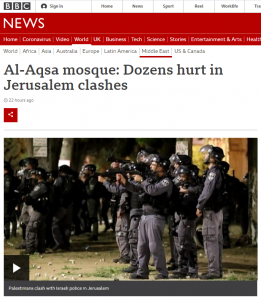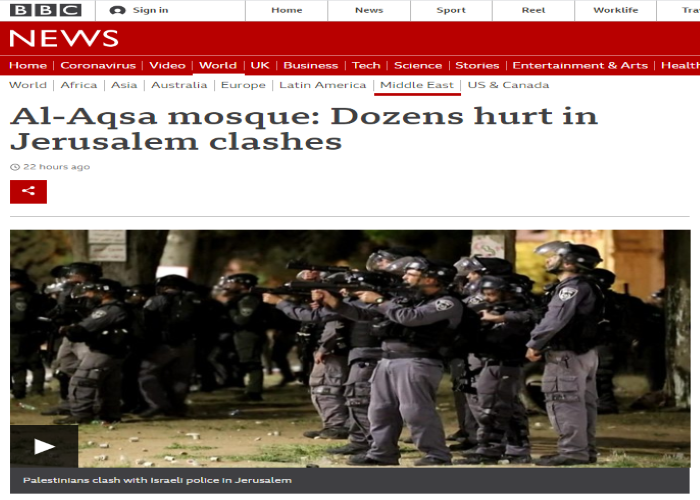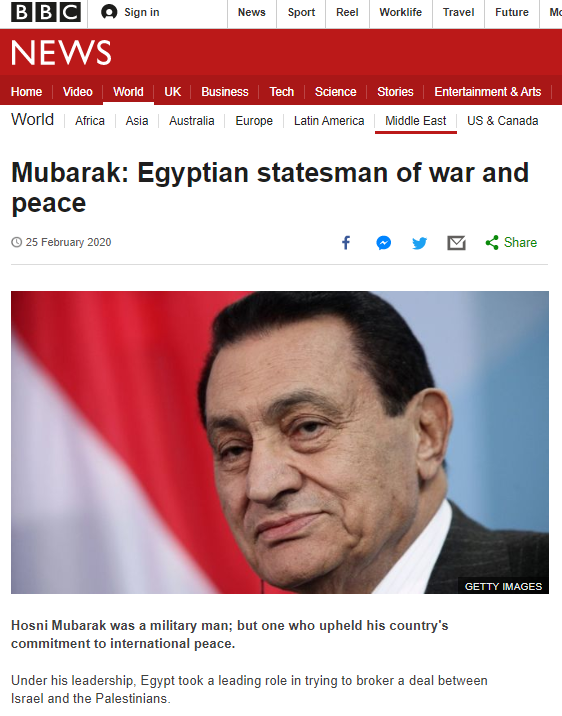Early on the morning of May 8th (Israel time) a report headlined “Al-Aqsa mosque: Dozens hurt in Jerusalem clashes” was published on the BBC News website’s ‘Middle East’ page.
Relating to incidents which took place the previous evening, the BBC’s report fails to provide an objective account of the sequence of events.
“At least 163 Palestinians and six Israeli police officers have been hurt in clashes in Jerusalem, Palestinian medics and Israeli police say.
Most were injured at the Al-Aqsa mosque, where Israeli police fired rubber bullets and stun grenades as Palestinians threw stones and bottles. […]
The site is a frequent flashpoint for violence, which unfolded again on Friday night after thousands had gathered there to observe the last Friday of the Muslim holy month of Ramadan.
Israeli police said they had used force to “restore order” due to the “rioting of thousands of worshippers” after evening prayers.” [emphasis added]
As reported by the local media, those “clashes” began because Palestinians initiated pre-planned violence.
“Israeli police burst into the Temple Mount compound on Friday evening after Palestinians threw rocks and bottles at officers, as widespread clashes in Jerusalem spread to the holy site following prayers held there on the last Friday of the Muslim holy month of Ramadan. […]
Police said Friday evening that force used “riot dispersal means following violent disturbances on the Temple Mount, during which hundreds of suspects began throwing stone, bottles and objects at police officers.”
Video from the scene showed pitched battles, with Palestinians throwing chairs, shoes, rocks and bottles, and shooting fireworks, and police responding with stun grenades, tear gas and rubber bullets.”
In paragraph five of the report readers find a reference to “The Al-Aqsa mosque complex”:
“The Al-Aqsa mosque complex in Jerusalem’s Old City is one of Islam’s most revered locations, but its location is also the holiest site in Judaism, known as the Temple Mount.”
That portrayal does not correspond with the BBC News style guide which states that the term that should be employed to describe that location is ‘Haram al Sharif’:
“Temple Mount
ie both words capped. Note that the area in Jerusalem that translates from Hebrew as the Temple Mount should also be described, though not necessarily in the first four pars, as known to Muslims as the Haram al-Sharif (ie lower case “al”, followed by a hyphen – and never “the al-Haram al-Sharif”, which is tautological). The Arabic translates as the Noble Sanctuary.”
Since November 2014 we have recorded numerous instances in which BBC journalists used the PLO recommended terminology “Al Aqsa Mosque Compound” in breach of BBC guidelines.
Starting in the third paragraph, the BBC’s explanation of the reason for the violence focuses audience attentions on one topic:
“Tensions have been rising over the potential eviction of Palestinians from land claimed by Jewish settlers. […]
The international community also appealed for de-escalation on Friday, as anger mounted over the threatened eviction of Palestinian families in East Jerusalem’s Shaikh [sic] Jarrah district. […]
Israel’s Supreme Court will hold a hearing on the long-running legal case on Monday.” [emphasis added]
In an insert of ‘analysis’ from the BBC Jerusalem bureau’s Yolande Knell, readers are told that:
“There has been nightly unrest over possible Palestinian evictions in nearby Sheikh Jarrah. […]
And there is deep concern about what could happen on Monday.
Israel’s Supreme Court is due to hold a hearing on the Sheikh Jarrah case as Israelis mark Jerusalem Day.”
Beyond that superficial framing of “threatened”, “potential” or “possible” evictions and amplification of statements from assorted foreign parties, no effort is made to provide BBC audiences with the proper background to that long-running story concerning property in the Sheikh Jarrah/Shimon HaTsadik neighbourhood of Jerusalem.
“On February 10, 2021, the Jerusalem District Court upheld an October 2020 Jerusalem Magistrate Court decision, requiring a number of Sheikh Jarrah residents to vacate properties they are living in by May 2, 2021. Following this decision, the residents appealed to the Supreme Court. The Court has given the two sides until May 6, to report if they have reached a compromise to settle out of court. […]
According to the Supreme Court, the land in question “was owned by Chief Rabbi (Hacham Bashi) Avraham Ashkenazi and Chief Rabbi Meir Orbach until the War of Independence [1948], after they purchased it in 1875 from its Arab owners.”
Subsequently, two Jewish organizations, Va’ad Eidat HaSfaradim and Va’ad HaKlali L’Knesset Yisrael, worked to register the land with British Mandatory government in 1946.
The properties were registered with Israeli authorities under these two organizations in 1973.
These organizations sold the properties to the Nahalat Shimon organization in 2003.
According to a 1979 High Court decision, and re-affirmed repeatedly in subsequent cases, as in the case of any tenant living on someone else’s property, residents living on the land owned by these organizations were required to pay rent to the organizations that owned the properties. Their failure to do so, along with instances of illegal building and illegally renting properties to others, resulted in the current legal proceedings against them, culminating in the District Court decision.”
Relatedly, the BBC’s report adopts the corporation’s typical practice of omitting all relevant history from before June 1967, including Jordan’s invasion and 19-year-long occupation of parts of Jerusalem, which is particularly relevant to the topic of the properties in Sheikh Jarrah.
“Israel has occupied East Jerusalem since the 1967 Middle East war and considers the entire city its capital, though this is not recognised by the vast majority of the international community.
Palestinians claim East Jerusalem as the future capital of a hoped-for independent state.”
“Israel’s Supreme Court is due to hold a hearing on the Sheikh Jarrah case as Israelis mark Jerusalem Day. The annual celebration of the capture of the east of the city during the 1967 Middle East War includes a flag march in the Old City that typically leads to clashes with local Palestinians.”
By focusing audience attentions on the Sheikh Jarrah story, the BBC’s report plays into the Hamas narrative and fails to provide audiences with any information concerning the additional issues which lie behind the violence on Temple Mount that is supposedly its topic. Readers are told nothing at all about the efforts of Hamas, other terror groups, the PA and interested parties to escalate tensions in Jerusalem and in other locations and the connection between that and Mahmoud Abbas’ indefinite postponement of Palestinian elections scheduled to be held later this month.
In Yolande Knell’s ‘analysis’ readers find a 46-word paragraph which includes the first mention by the BBC News website of a terror attack at Tapuach Junction that took place six days earlier on May 2nd.
“Elsewhere in the occupied West Bank, two Palestinians were shot dead after firing at an Israeli military base on Friday. Earlier in the week, a Palestinian gunman killed an Israeli religious student and a Palestinian teenager was killed in clashes with Israeli forces searching for him.”
BBC audiences are not told that in addition to 19-year-old Yehuda Guetta (who Knell chose not to identify by name and age) who died three days after that shooting attack at a bus stop, two other Israeli teenagers were also wounded in the same attack. Neither are they informed that the terrorist was praised by Hamas and by Fatah or that the “Palestinian teenager” killed on May 5th was throwing petrol bombs at the Israeli soldiers at the time.
The May 7th attack near the Salem base in northern Samaria was also not reported separately by the BBC and so audiences are not aware of the fact that three terrorists were involved, two of whom were killed as they got off a bus and opened fire. Knell did not bother to tell her readers that according to Palestinian sources, the three “identified with the Hamas terror group”.
The BBC’s neglection of documentation of the range of incidents that have taken place and joining all the relevant dots means that this report fails to properly inform readers as to why there were “clashes” in Jerusalem on Friday night.
The fact that the BBC has chosen to promote a superficial but more photogenic version of the Sheikh Jarrah story as the reason for those “clashes” shows that it is more interested in amplifying the narrative promoted by Hamas and assorted political NGOs than providing its audiences with the full range of information necessary to understand the events.
Related Articles:
MAPPING CHANGES IN THE TERMINOLOGY USED BY THE BBC TO DESCRIBE TEMPLE MOUNT
PLO RECOMMENDED TERMINOLOGY CONTINUES TO APPEAR IN BBC CONTENT
PLO TERMINOLOGY RETURNS IN BBC JERUSALEM DAY REPORT






The photographs of the piles of rocks are concrete (excuse the pun) evidence that this is pre-planned violence by the Palestinians yet amazingly reporters do not see that. Neither do they seem to see 300 missiles indiscriminately launched towards the civilian population of Israel as provocative or illegal, so Gaza will reap what it sows tenfold